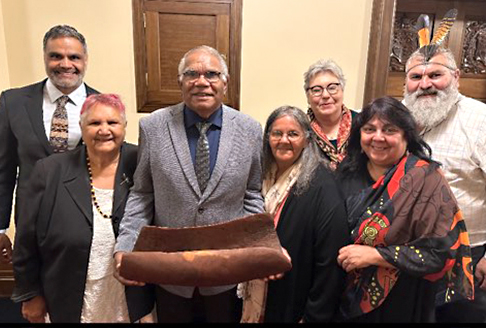Baptcare’s Uncle Charles invited to be part of historic Bill signing
- 06 Apr 2023

Baptcare congratulates Uncle Charles Jackson OAM on his recent involvement in a moment of historic importance: the signing of the bill recognising the First Nations Voice to the South Australian Parliament.
Uncle Charles is a valued part of Baptcare’s Family and Community Services team and works as an NDIA Local Area Coordinator in South Australia’s Yorke Mid-North region.
Uncle Charles was one of a select group of Aboriginal community members invited to walk with the Speaker of the House, Terry Stephens, as he delivered the Bill to the Governor, and to witness the signing of the Bill.
This invitation acknowledges Uncle Charles’ dedication and commitment to the development and progression of this Bill.
“The day brought lots of emotion for me personally,” Uncle Charles said.
“There were five or six thousand people gathered there to celebrate ‘The History in the Making’.
“This milestone in our state has laid the foundation for the rest of the states and federal governments to do likewise. The passing of the Bill will give First Nations people the capability to advocate, negotiate and influence the policies that have direct responsibility for service delivery.
“At present, there are no mechanisms within the government framework to involve Aboriginal & Torres Strait Islander people. What we have now is a legislative document which stipulates how the government process will work when dealing with matters that concern First Nations people.”
Baptcare is proud and grateful to have a person of such stature working with us. Congratulations Uncle Charles!
Community news
-

Back to School Tips for Foster and Kinship Carers
Heading back to school can be exciting, but it can also bring up big feelings—especially for kids in care. Here are a few simple ways to help make the transition smoother.
- 17 Apr 2025
-

Easter Reflection from Emily Booth of our Spiritual Care Team
A few years ago, at Easter, I was staying with my sister and her family for the weekend. One afternoon we were all sitting around chatting and the kids were playing when my sister came into the room and placed a tray of fresh, warm hot cross buns on the table
- 16 Apr 2025
-

Student Volunteer Spotlight - Erin
Did you know that Baptcare has student volunteers at some of our Residential Aged Care communities? Our volunteers are an integral part of our Baptcare community, not only in residential aged care but across many of our programs and services. Volunteers provide essential connection, positivity and assistance to residents, clients and consumers.
- 04 Apr 2025
